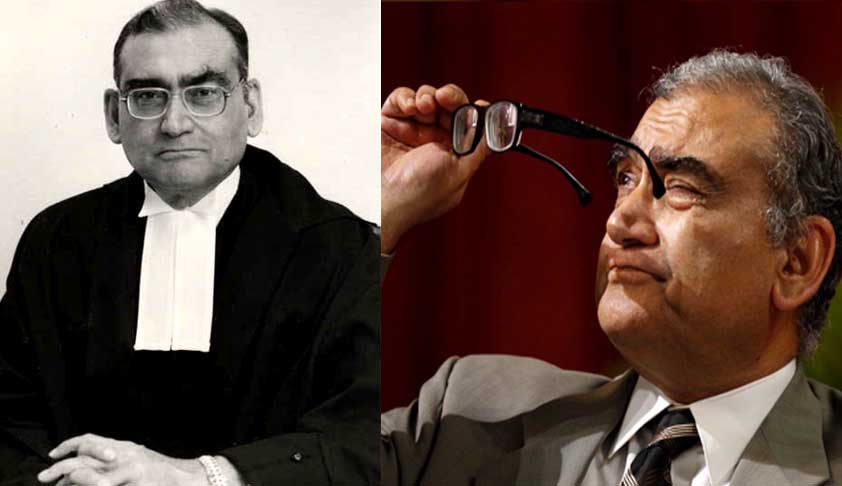Deconstructing Justice Katju
P.V Dinesh
28 Sept 2016 11:33 AM IST

In his blog ‘Satyam Bruyat’, Justice Katju has for quite some time been taking digs at everyone and everything. The frequency and intensity of his social media activism has gathered considerable momentum in the last few months. His fingers are constantly on the move, it is not mere facebook posts or tweets, it is an act of 'postering' all across the social media. He seems to be unperturbed of opinion being formed about him, the Court once he presided or judiciary as a whole.
The causality is, no one takes him seriously. If his findings are accepted, we need an overnight replacement of supreme Court judges except two, whom he named in one of his highly controversial blog post. The chronic social media posts of the former judge has now grown more than an exercise of attention seeking to 'begging for a contempt notice' from the Supreme Court. It seems, the Court is annoyingly ignoring him – just ignoring.
Recently, the Supreme Court acquitted a rapist of murder charges and sentenced him for life for the offence of rape. Negating the elementary principles of constructive criticism, Justice Katju has gone on record to say that Supreme Court judge lacks intelligence. In his email to SC Judges recently, he went to the extent of saying –
“I am sorry, but I can take this no longer. Have the police and some judges gone mad? Have they no shame? And you Supreme Court Judges, have you no shame either?”
Chief Justice Thakkur is his new found enemy, Justice Katju has been posting about Chief Justice Thakur and Justice Lodha on the BCCI judgment, a review for it and why Justice Thakur should recuse from hearing it. He had every reason to criticise the BCCI judgment, had he not delivered a judgment on similar lines of BCCI. Chief Justice Thakur could have avoided snubbing him, while he was hearing Justice Katju's own petition against proceedings initiated by the Parliament.
Justice Katju is against judges making laws, and they should not. But while posting indiscriminately, he has conveniently forgotten his own judgements to the said effect .In Aruna Ramchandra Shanbaug vs Union Of India, the Bench headed by Justice Katju allowed passive euthanasia by Judicial Legislation. He held that passive euthanasia is legal even ‘without legislation’ provided certain conditions and safeguards are maintained.
In Para-126 of the Judgment, Justice Katju observes;
“There is no statutory provision in our country as to the legal procedure for withdrawing life support to a person in PVS or who is otherwise incompetent to take a decision in this connection. We agree with Mr. Andhyarujina that passive euthanasia should be permitted in our country in certain situations, and we disagree with the learned Attorney General that it should never be permitted. Hence, following the technique used in Vishakha's case, we are laying down the law in this connection which will continue to be the law until Parliament makes a law on the subject”.
In the above Judgment Justice Katju created a complete mechanism for dealing with the cases of Passive Euthanasia. When he was asked about this, he replied that there can be some exceptions..
Was it not a Judicial legislation and why his theory of judicial-separation not applied in that Case?
While Justice Katju has been criticizing Judiciary of encroachment and diluting separation of powers, he himself broke all records in Pushpa Vanti vs Union Of India & Ors when he directed the Central Government to set up a Commission called the Armed Forces Grievances Redressal Commission to look into any grievances by serving or former members of the armed forces or their widows or family members. He even gave the composition and rules governing the commission and virtually drafted a whole new Act itself. Not only this, Justice Katju even appointed the first Chairman as Justice Kuldip Singh, the first Vice Chairman as Justice S.S. Sodhi and all other members, all by himself. He further went ahead to decide duration, salary-allowances, headquarters and terms of the commission and directed the Central Government to issue notification constituting the Commission as provided. This order was later recalled.
In 2010 in Satya Narayan Tiwari vs. State of U.P. while upholding the conviction of the accused U/S 304B and 498A the Bench headed by Justice Katju wrote “In fact, it was really a case under S.302 IPC and death sentence should have been imposed in such a case, but since no charge under S.302 IPC was levelled, we cannot do so, otherwise, such cases of bride burning, in our opinion, fall in the category of rarest of rare cases, and hence deserve death sentence”.
Just three weeks after the above Judgment, venturing into judicial legislation the same Bench delivered the Rajbir @ Raju & Anr. v State of Haryana, wherein Justice Katju further rendered specific directions to all the subordinate Courts in India to ordinarily add Section 302 IPC to the charge under Section 304B IPC.
In Jasvinder Saini & Ors Vs State, a Bench headed by Justice Thakur had to correct the confusion created by Rajbir @ Raju & Anr. v State of Haryana (read justice Katju) and put an end to the practice of mechanically adding the charge of Murder (S.302 IPC) in all Dowry Death Cases(S.304 IPC) by trial Courts following a blanket directive of the Supreme Court in Rajbir.
While Justice Katju took a dig at Justice Dave for observing orally that Bhagwad Geeta must be taught in schools, he had opined in an open Court that any Muslim that sported a beard must, by necessary implication, belong to the Taliban. While summarily dismissing the SLP of a Muslim student petition against his school's decision to remove him from the school for keeping a beard, Justice Katju also spoke "We don't want to have Taliban's in the country?," while claiming he was a secularist. After the petitioner had expressed apprehension that Justice Katju was biased, the Bench withdrew the Order and requested the Chief Justice of India to place the matter before another bench for hearing.
In Baldev Singh v. State of Punjab Justice Katju virtually amended the statute book and reduced the mandatory minimum sentence of 10 years to the period of sentence already undergone(3yrs) on payment of a sum of Rupees 50,000/- to the victim and held that compromise between rape survivor and rape convict can be a ground to reduce sentence of imprisonment. In Shimbhu v State of Haryana, the Supreme Court was once again forced to cure a ‘Katju’ and held that Baldev Singh will not be used as a precedent and warned the High Courts and trial Courts against leniency towards rape convicts and also added that orders imposing sentence less than prescribed or releasing accused on the grounds that period of sentence has already been undergone would reflect insensitivity of Court towards rape survivor and society.
Most interestingly, Justice Katju who accused Justice Gogoi of not following principles of hearsay in evidence jurisprudence had in Bhagwan Dass v NCT of Delhi , crossed the rider u/s 161 and 162 CrPC when he authored that “We are of the opinion that the statement of Dhillo Devi to the police can be taken into consideration in view of the proviso to section 162(1) Cr.P.C and her subsequent denial in Court is not believable because she obviously had after thoughts and wanted to save her son ( the accused) from punishment. In fact in her statement to the police she had stated that the dead body of Seema was removed from the bed and placed on the floor. When she was confronted with this statement in Court, she denied that she had made such a statement before the police. We are of the opinion that her statement to the police can be taken into consideration in view of the proviso to 162(1) CrPC”.
A Division Bench of Allahabad High Court in which Justice Katju was also a Member took suo-moto Cognizance in Red Light On The Cars Of The Hon'ble Judges vs State Of U.P.and passed an order holding that stopping of the vehicles of the Hon'ble Judges (low intellectual level?) by traffic policemen was in itself contemptuous in nature. It also directed the Registry of High Court to see that the vehicle of the Hon'ble Judge should contain the writing either on the number plate or separately, in terms "High Court Allahabad" on the official vehicle, otherwise the words "Judge, High Court, Allahabad" and The said writing may also be in Hindi Devnagari. The Bench also issued a general mandamus to the State Government, its authorities, officers, employees, agents etc. not to create any impediment in the user of the red light at the top of the vehicle by the Hon'ble Judges of the High Court and also for not causing any inconvenience and obstruction of any nature in any manner except as authorised under this order. All the concerned authorities and persons are mandated for complying with the order punctually.
Supreme Court judges are not beyond the pale of criticism, but the level of criticism being raised now is certainly very objectionable. The time has come to seriously think about a code of conduct for former Judges. The public see and treat them as Justices, no matter they retired or serving, they visualise the judiciary and justice delivery system through them. Sir, you can be an iconoclast (comfortable), but at what cost ?
 P.V.Dinesh is a Practising Lawyer in the Supreme Court of India.
P.V.Dinesh is a Practising Lawyer in the Supreme Court of India.


